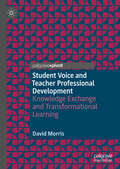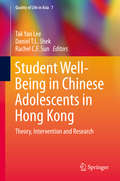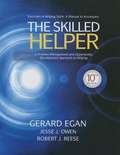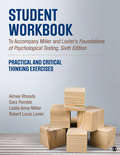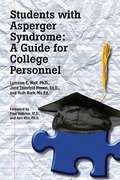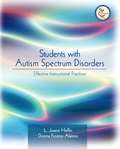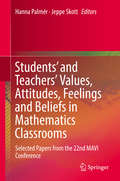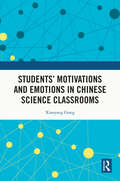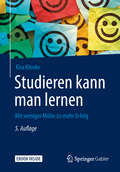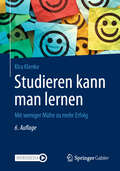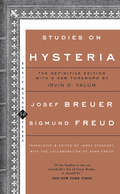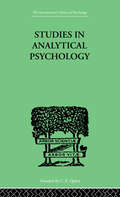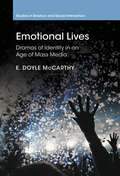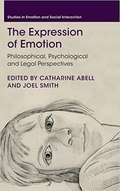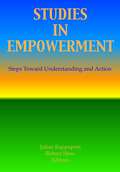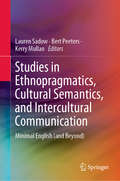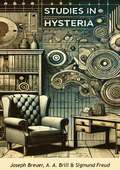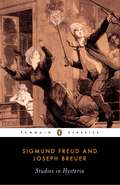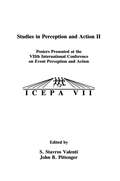- Table View
- List View
Student Voice and Teacher Professional Development: Knowledge Exchange and Transformational Learning
by David MorrisThis book explores the role of students’ involvement in teacher professional development. Building upon a research study whereby pupils instruct their teachers in the use of Information and Communication Technology (ICT), the author argues that using student voice in this way can result in transformational learning for all those involved. The author presents the processes and experiences of pupils taking on the role of educators as well as the experiences of the teachers receiving such professional development from their students. In doing so, he promotes the innovative use of a student voice initiative to support teaching and learning, with the overarching purpose of improving and transforming teacher-pupil relationships. This book will be of interest and value to students and scholars of pupil voice, teacher professional development and transformational learning.
Student Well-Being in Chinese Adolescents in Hong Kong
by Rachel C. F. Sun Daniel T.L. SHEK Tak Yan LeeThis book reviews the theories regarding commonly occurring developmental issues among Chinese adolescents in Hong Kong, the application of Positive Youth Development (PYD) to a large-scale primary prevention program and the impact of PYD on student well-being, indexed according to adolescent developmental issue. Using multiple strategies, it presents the overall constructs and frameworks supporting P. A. T. H. S. in response to the various psychosocial needs of Hong Kong's youth. Some of the issues covered include substance abuse, sexual behavior, internet addiction, bullying and cyber-bullying. The book argues for the effectiveness of the school-based program in promoting student well-being in modern Hong Kong society and will be of interest to undergraduate and postgraduate students, university instructors, researchers, social workers, pediatricians, youth workers, educators, administrators, psychologists, school principals and allied professionals looking to promote whole-person development in junior form students and especially those with an interest in education in China.
Student Workbook Exercises for Egan's the Skilled Helper
by Gerard EganThe manual allows you to complete self-development exercises as well as practice communication skills and each of the steps of the model in private before using them in actual face-to-face helping interactions with others.
Student Workbook To Accompany Miller and Lovler’s Foundations of Psychological Testing: Practical and Critical Thinking Exercises
by Leslie A. Miller Robert L. Lovler Sara D. Pemble Aimee RhoadsThis practical workbook offers a wealth of opportunities for students to apply knowledge learned from the best-selling core text, Foundations of Psychological Testing, Sixth Edition. Exercises and projects allow students to review, engage in, and master concepts, while multiple choice and short answer questions allow students to assess their understanding at the conclusion of each chapter.
Student Workbook To Accompany Miller and Lovler’s Foundations of Psychological Testing: Practical and Critical Thinking Exercises
by Leslie A. Miller Robert L. Lovler Sara D. Pemble Aimee RhoadsThis practical workbook offers a wealth of opportunities for students to apply knowledge learned from the best-selling core text, Foundations of Psychological Testing, Sixth Edition. Exercises and projects allow students to review, engage in, and master concepts, while multiple choice and short answer questions allow students to assess their understanding at the conclusion of each chapter.
Students with Asperger Syndrome: A Guide for College Personnel
by Lorraine E. Wolf Jane Thierfeld Brown G. Ruth Kukiela BorkFor many students with autism spectrum disorders, getting admitted to college is the easy part. Surviving and succeeding can be quite another, as these students transition into a system that is often unprepared to receive them. Accommodating students whose disabilities very likely fall in social and self-regulatory areas is a particular challenge for disability services providers who are not used to reaching out into so many areas of student life. This comprehensive book offers disability services professionals practical strategies for accommodating and supporting students in all phases of college life and beyond.
Students with Autism Spectrum Disorders: Effective Instructional Practices
by L. Juane Heflin Donna Fiorino AlaimoBroadened public awareness of autism and other associated spectrum disorders, combined with continuing research, means that more students than ever before are being identified with these disabilities. This book is an excellent resource for any teacher working with students who have ASD because it discusses how to identify and describe individuals with autism spectrum disorder, develop effective programs, create contexts for instruction, accommodate sensory issues, use applied behavior analytic instructional strategies and program for challenging behavior. Separate chapters are devoted to communication, socialization, academic skill acquisition and non-academic environments. Information on the use of technology is infused throughout the book and makes this an invaluable reference for educators.
Students' and Teachers' Values, Attitudes, Feelings and Beliefs in Mathematics Classrooms: Selected Papers from the 22nd MAVI Conference
by Hanna Palmér Jeppe SkottThis contributed volume is an exciting product of the 22nd MAVI conference, which presents cutting-edge research on affective issues in teaching and learning math. The teaching and learning of mathematics is highly dependent on students’ and teachers’ values, attitudes, feelings, beliefs and motivations towards mathematics and mathematics education. These peer-reviewed contributions provide critical insights through their theoretically and methodologically diverse analyses of relevant issues related to affective factors in teaching and learning math and offer new tools and strategies by which to evaluate affective factors in students’ and teachers’ mathematical activities in the classroom. Among the topics discussed: The relationship between proxies for learning and mathematically related beliefs.Teaching for entrepreneurial and mathematical competences.Prospective teachers’ conceptions of the concepts mean, median, and mode.Prospective teachers’ approach to reasoning and proofThe impact of assessment on students’ experiences of mathematics. Through its thematic connections to teacher education, professional development, assessment, entrepreneurial competences, and reasoning and proof, Students' and Teachers' Values, Attitudes, Feelings and Beliefs in Mathematics Classrooms proves to be a valuable resource for educators, practitioners, and students for applications at primary, secondary, and university levels.
Students’ Motivations and Emotions in Chinese Science Classrooms
by Xiaoyang GongThe book reviews and examines students’ motivations and emotions in Chinese science classrooms. By adopting different approaches such as content analysis, factor analysis, path analysis, and latent profile analysis, the author analyzes the content of literature, curriculum standards and textbooks, classroom observations, survey data, interview data, and open-ended responses from students and teachers through a literature review and six empirical studies. The findings may provide insights for education researchers and practitioners seeking to improve science teachers’ pedagogical practices and create friendlier classroom environments. Researchers of science education or those who are interested in investigating students’ affective perceptions in specific subject contexts will find this book interesting.
Studieren kann man lernen: Mit Weniger Mühe Zu Mehr Erfolg
by Kira KlenkeSie möchten den Lernstoff schneller verstehen und besser für die Prüfung behalten? – Dieses Buch präsentiert Ihnen ein praxiserprobtes Selbstcoaching-System, das Sie zuverlässig durchs Studium navigiert. Die Autorin enttarnt gängige Lernmythen und vermittelt Motivationshilfen, Lerntechniken und mentale Tricks, die Sie an der Uni so nicht lernen. Sie zeigt Ihnen, wie Sie sich kraftvoller fühlen, zuversichtlicher und selbstbewusster studieren, Stress und Prüfungsangst reduzieren, effektiver arbeiten und bessere Noten erreichen. Rückmeldungen von Leserinnen und Lesern belegen dies vielfach.Jedes Kapitel startet mit übersichtlichen Lernzielen und endet mit praktischen Tipps für Ihren Studienalltag. Die aktuelle fünfte Auflage erscheint neu mit eBook inside, um Ihren persönlichen Fortschritt auf allen Ebenen noch besser zu unterstützen.
Studieren kann man lernen: Mit weniger Mühe zu mehr Erfolg
by Kira KlenkeLeichter, selbstbewusster und stressfreier lernen mit deutlich besseren NotenSind Sie lustlos und unmotiviert in Ihrem Studium? Oder gehören Sie zu den Arbeitstieren, die unter der Workload vergessen zu leben?Dieser Ratgeber entlarvt irreführende Lernmythen und vermittelt Motivationshilfen, Lerntechniken und mentale Tricks, die Sie so an der Uni nicht lernen. In jedem Kapitel finden Sie auf einen Blick eine Übersicht der Lernziele am Anfang und eine Checkliste mit Tipps für die praktische Umsetzung am Ende.Erfahren Sie, wie Sie• leichter lernen als bisher, motiviert und effektiv,• Glaubenssätze, die Ihr Lernen behindern, aufdecken und upgraden,• Selbstzweifel und Ängste überwinden,• sich motivierend kraftvolle Ziele fürs Studium setzen - und sie auch erreichen,• Schreibhemmungen überwinden und mühelos gute Texte verfassen.Nach dem Erfolg der früheren fünf Auflagen wurde die aktuelle, überarbeitete sechste Auflagedurch Lern-Meditationen ergänzt, abrufbar mit der App SN More Media. Diese Audios führen Sie schnell in einen entspannten Zustand, in dem das Gedankenkarussell im Kopf zur Ruhe kommt, und helfen Ihnen, selbstbewusst, motiviert und leichter zu studieren.
Studies On Hysteria
by Sigmund Freud Joseph BreuerThe cornerstone of psychoanalysis-and legacy of the landmark Freud/Breuer collaboration-featuring the classic case of Anna O. and the evolution of the cathartic method, in the definitive Strachey translation. Re-packaged for the contemporary audience with what promises to be an unconventional foreword by Irvin Yalom, the novelist and psychiatrist who imagined Breuer in When Nietzsche Wept.
Studies in Analytical Psychology (International Library Of Psychology)
by Gerhard AdlerFirst published in 1999. Routledge is an imprint of Taylor & Francis, an informa company.
Studies in Emotion and Social Interaction: Dramas of Identity in an Age of Mass Media (Studies in Emotion and Social Interaction)
by Mccarthy E. DoyleEmotional Lives explores the changes in emotional cultures that have taken place during the last half century and continue to affect people's identities today. These changes are driven by the culture of consumerism in contemporary post-industrial society and by the emergence of new ideas about public and private life in a time when media culture generates new forms of social relationships and deep personal attachments to celebrity figures. McCarthy shows that people are drawn to public life, not only for entertainment and pleasure but also for its dramas, for memorializing events like disasters, acts of violence, and victimhood. McCarthy's cultural-sociological approach provides new insights about emotions as 'social things' and reveals how today's mass media is an important force for cultural change, including changes in people's relationships, identities, and emotions.
Studies in Emotion and Social Interaction: Emotional Mimicry in Social Context
by Ursula Hess Hess, Ursula and Fischer, Agneta H. Agneta H. FischerIn everyday life we actively react to the emotion expressions of others, responding by showing matching, or sometimes contrasting, expressions. Emotional mimicry has important social functions such as signalling affiliative intent and fostering rapport and is considered one of the cornerstones of successful interactions. This book provides a multidisciplinary overview of research into emotional mimicry and empathy and explores when, how and why emotional mimicry occurs. Focusing on recent developments in the field, the chapters cover a variety of approaches and research questions, such as the role of literature in empathy and emotional mimicry, the most important brain areas involved in the mimicry of emotions, the effects of specific psychopathologies on mimicry, why smiling may be a special case in mimicry, whether we can also mimic vocal emotional expressions, individual differences in mimicry and the role of social contexts in mimicry.
Studies in Emotion and Social Interaction: From Self to Social Relationships
by Van Zomeren MartijnWhat is it that moves and motivates us in our lives? Martijn van Zomeren proposes social relationships are at the essence of this key question and, in a fascinating investigation into human motivation, he develops a novel and integrative psychological theory termed 'selvations theory'. The theory suggests that we are essentially relational beings that seek to regulate relationships in response to felt changes in our network of relationships (selvations). However, we need to do this in culturally appropriate ways and this is where our culturally construed self comes to be of use. From Self to Social Relationships constitutes a powerful argument about human essence, integrating major theories in and around psychology, which has strong implications for the study and practice of social motivation.
Studies in Emotion and Social Interaction: The Expression of Emotion
by Catharine Abell Joel SmithThe Expression of Emotion collects cutting-edge essays on emotional expression written by leading philosophers, psychologists, and legal theorists. It highlights areas of interdisciplinary research interest, including facial expression, expressive action, and the role of both normativity and context in emotion perception. Whilst philosophical discussion of emotional expression has addressed the nature of expression and its relation to action theory, psychological work on the topic has focused on the specific mechanisms underpinning different facial expressions and their recognition. Further, work in both legal and political theory has had much to say about the normative role of emotional expressions, but would benefit from greater engagement with both psychological and philosophical research. In combining philosophical, psychological, and legal work on emotional expression, the present volume brings these distinct approaches into a productive conversation.
Studies in Emotion and Social Interaction: The Interpersonal Dynamics of Emotion
by van Kleef, Gerben A.Emotions are an elemental part of life - they imbue our existence with meaning and purpose, and influence how we engage with the world around us. But we do not just feel our own emotions; we typically express them in the presence of other people. How do our emotional expressions affect others? Moving beyond the traditional intrapersonal perspective, this is the first book dedicated to exploring the pervasive interpersonal dynamics of emotions. Integrating existing theory and research, van Kleef develops the Emotions as Social Information (EASI) theory, a groundbreaking comprehensive framework that explains how emotional expressions influence observers across all domains of life, from close relationships to group settings, conflict and negotiation, customer service, and leader-follower relations. His deeply social perspective sheds new light on the fundamental question of why we have emotions in the first place - the social influence emotions engender may very well constitute their raison d'être.
Studies in Empowerment: Steps Toward Understanding and Action
by Robert E HessThis adaptable book offers diverse applications of the empowerment model to the promotion of mental health and the prevention of mental illness. Topics span the developmental trends of empowerment as an individual achievement, a community experience, and a professional aim in relation to social intervention strategies and tactics.
Studies in Ethnopragmatics, Cultural Semantics, and Intercultural Communication: Minimal English (and Beyond)
by Bert Peeters Kerry Mullan Lauren SadowThis book is the third in a three-volume set that celebrates the career and achievements of Cliff Goddard, a pioneer of the Natural Semantic Metalanguage approach in linguistics. This third volume explores the potential of Minimal English, a recent offshoot of the Natural Semantic Metalanguage, with special reference to its use in Language Teaching and Intercultural Communication.Often considered the most fully developed, comprehensive and practical approach to cross-linguistic and cross-cultural semantics, Natural Semantic Metalanguage is based on evidence that there is a small core of basic, universal meanings (semantic primes) that can be expressed in all languages. It has been used for linguistic and cultural analysis in such diverse fields as semantics, cross-cultural communication, language teaching, humour studies and applied linguistics, and has reached far beyond the boundaries of linguistics into ethnopsychology, anthropology, history, political science, the medical humanities and ethics.
Studies in Hysteria
by Sigmund Freud A. A. Brill Joseph BreuerDiscover the foundational work that laid the groundwork for modern psychoanalysis with Studies in Hysteria, co-authored by Joseph Breuer and Sigmund Freud. This seminal book explores the mysterious and often misunderstood condition of hysteria, providing groundbreaking insights into the human psyche and the development of psychoanalytic theory.Published in 1895, Studies in Hysteria presents a series of detailed case studies and theoretical essays that delve into the symptoms, causes, and treatment of hysteria. Breuer and Freud’s collaborative effort marks a pivotal moment in the history of psychology, offering a new perspective on the connection between mind and body.Joseph Breuer, a renowned physician, and Sigmund Freud, then an emerging neurologist, explore the use of "talking cure" or cathartic method as a therapeutic technique. They detail how repressed emotions and traumatic experiences can manifest as physical symptoms, and how bringing these unconscious memories to consciousness can lead to healing. The book includes the famous case of Anna O., whose treatment by Breuer is considered a landmark in the history of psychoanalysis. This and other case studies illustrate the complex interplay between psychological and physical symptoms and demonstrate the efficacy of psychoanalytic techniques.Studies in Hysteria is not only a cornerstone of psychoanalytic literature but also a fascinating read for anyone interested in the history of psychology, the origins of therapeutic practice, and the intricate workings of the human mind.Join Joseph Breuer and Sigmund Freud in exploring the early stages of psychoanalytic thought and uncovering the hidden depths of the human psyche. Studies in Hysteria is a timeless exploration of the mind that remains relevant and influential over a century after its publication.
Studies in Hysteria
by Sigmund Freud Josef BreuerHysteria—the tormenting of the body by the troubled mind—is among the most pervasive of human disorders; yet, at the same time, it is the most elusive. Freud’s recognition that hysteria stemmed from traumas in the patient’s past transformed the way we think about sexuality. Studies in Hysteria is one of the founding texts of psychoanalysis, revolutionizing our understanding of love, desire, and the human psyche. As full of compassionate human interest as of scientific insight, these case histories are also remarkable, revelatory works of literature. .
Studies in Hysteria (Penguin Modern Classics)
by Sigmund FreudThe tormenting of the body by the troubled mind, hysteria is among the most pervasive of human disorders - yet at the same time it is the most elusive. Freud's recognition that hysteria stemmed from traumas in the patient's past transformed the way we think about sexuality. Studies in Hysteria is one of the founding texts of psychoanalysis, revolutionizing our understanding of love, desire and the human psyche.
Studies in Macroeconomic History: On Central Banking
by Jan Fredrik QvigstadIn these six lectures given at the Norwegian Royal Academy of Science and Letters, Jan Qvigstad draws on his deep experience at Norges Bank to outline key principles on which to base central bank policy. The first two lectures (Keeping promises and Transparency) emphasize the importance of credibility and ensuring accountability. Lectures 3-6 can be viewed as applying these key principles to specific issues (Making good decisions; Managing wealth; Learning from history; and Institutions). The lectures do not break new ground - indeed, Qvigstad nicely illustrates how these principles have been articulated in literature, history and politics. Rather, the lectures emphasize the lessons to be drawn by applying these principles to central banking history with primary reference to the case of Norway, such as managing Norway's sovereign wealth fund and designing institutions that will produce good policy outcomes.
Studies in Perception and Action II: Posters Presented at the VIIth international Conference on Event Perception and Action (Studies in Perception and Action)
by S. Stavros Valenti John B. PittengerThis volume offers a comprehensive view of posters presented at the VIIth International Conference on Event Perception and Action. Arranged in order of appearance of their corresponding symposia on the conference program, this collection of 80 miniature articles on event perception and action represents the work of 136 researchers from 13 countries.
